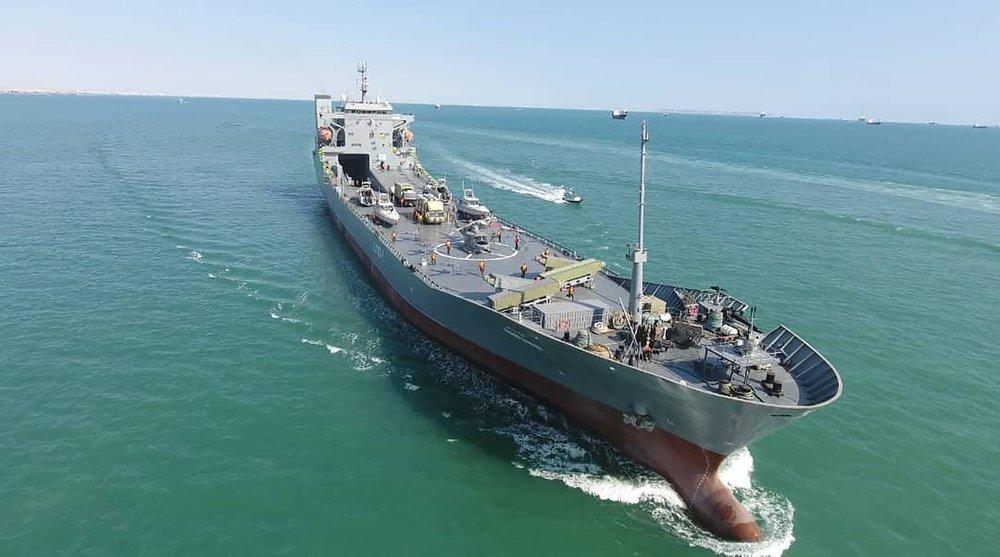


The Indian Navy ships of the First Training Squadron have arrived in the port city of Bandar Abbas, Iran for a joint training deployment in the Persian Gulf. This visit marks an important step in strengthening maritime cooperation between India and Iran. During the visit, the ships will participate in various activities to enhance maritime security and interoperability between the two navies. This visit highlights India's commitment to promoting regional cooperation in line with the vision of SAGAR.
India and Iran Strengthen Maritime Cooperation with Joint Training Deployment
The Indian Navy's First Training Squadron has embarked on a historic visit to Bandar Abbas, Iran, for a joint training deployment in the Persian Gulf. This collaboration marks a significant advancement in maritime cooperation between the two nations.
Background:
India and Iran share a long history of cultural, economic, and strategic ties. In recent years, there has been a growing emphasis on enhancing maritime cooperation to address common security challenges in the Indian Ocean Region (IOR).
Joint Training Deployment:
The First Training Squadron, comprising Indian Navy ships INS Tir (A86) and INS Shardul, arrived in Bandar Abbas on February 26, 2023. During their stay, the Indian and Iranian navies will conduct joint exercises, including anti-submarine warfare drills, communication drills, and ship handling exercises.
This training deployment aims to improve maritime security and interoperability between the two navies, enhancing their ability to jointly respond to threats in the Persian Gulf and IOR.
Significance:
The joint training deployment highlights India's active engagement in promoting regional cooperation in line with the SAGAR (Security and Growth for All in the Region) initiative. It underscores India's commitment to maintaining a secure and stable maritime environment in the IOR, which is vital for global trade and energy security.
FAQs:
1. What is the purpose of the joint training deployment? To enhance maritime security and interoperability between the Indian and Iranian navies.
2. How long will the training deployment last? The duration of the training deployment has not been disclosed publicly.
3. What ships are involved in the deployment? INS Tir (A86) and INS Shardul from the Indian Navy.
4. Has India had joint training deployments with Iran before? Yes, there have been previous joint exercises between the Indian and Iranian navies in the past.
5. What are the strategic implications of India's growing maritime cooperation with Iran? It strengthens regional cooperation, enhances India's influence in the Persian Gulf, and promotes maritime security in the IOR.

A stampede at the Kasibugga Venkateswara Swamy Temple in Andhra Pradesh has left 10 dead and two injured. The temple had recently reopened and was experiencing high footfall due to a festival. Home Minister Vangalapudi Anitha has ordered a thorough investigation into the causes of the tragedy and has promised strict measures to prevent similar incidents in the future.

India and the United States have strengthened their already strong ties by signing a 10-year framework for their major defense partnership. The agreement, signed during a bilateral meeting between the two countries' defense ministers, emphasizes the importance of this partnership in maintaining a free and open Indo-Pacific region. This marks a significant step in solidifying the bond between India and the US in the defense sector.

In preparation for a major tri-service military drill, India has issued Notices to Airmen (NOTAM) for the entire northeastern region that borders China, Bhutan, Myanmar, and Bangladesh. The first set of exercises will commence in November and continue through January, signaling enhanced operational readiness for the Indian Air Force (IAF). This move is significant as the Northeast remains a sensitive theater, making up the boundary with four countries, including China. The upcoming IAF exercises aim to strengthen India's air dominance, effectively preparing for any potential challenges along the western frontier with Pakistan.

India will conduct a 10-day military exercise in Rajasthan and Gujarat involving the Army, Air Force, and Navy to showcase its operational readiness following Operation Sindoor earlier this year. The exercise, announced through a NOTAM, features advanced military technologies and emphasises the integration of speed, firepower, and precision in desert warfare conditions. It comes amidst heightened tensions with Pakistan and a renewed focus on maintaining military readiness along the border.

Jammu and Kashmir police have filed an FIR against a group of Christian missionaries in Kathua district for allegedly attempting religious conversions through financial incentives. This comes after a video surfaced online showing the missionaries being attacked and their vehicle vandalized by villagers. The incident has sparked outrage and protests from local Hindu groups, demanding action against the accused missionaries. One accused, Ravindra Singh Thela, has been arrested while the main accused, Vivek Soni, is still at large. The police have also suspended eight personnel for failing to stop the attack.

US Vice President JD Vance, who converted to Catholicism in 2019, has revealed that he hopes his Hindu-raised wife, Usha Vance, will eventually embrace Christianity. However, he clarifies that their interfaith marriage is built on mutual respect and understanding, and that Usha has complete freedom of choice in matters of faith. The couple has found a balanced way to manage their interfaith household, with their children attending a Christian school and given the choice to be baptized.

US President Donald Trump has expressed optimism about reaching a trade deal with China "pretty soon" after a meeting with Chinese President Xi Jinping in South Korea. In addition to announcing lower tariffs on Chinese imports, Trump also stated that the issue over US access to rare earths has been resolved. However, there has been no official response from Beijing and the final decision on the sale of Chinese-owned TikTok's US operations is still pending. Analysts see these developments as a breakthrough in the ongoing trade tensions between the two countries. Our correspondents provide insight on the discussions between the two leaders and speculate on why Xi may have felt confident walking into the meeting.

At the Asia-Pacific Economic Cooperation (APEC) Summit in South Korea, Chinese President Xi Jinping and US President Donald Trump met for their first in-person talks in several years. Despite past frictions, Xi called for closer cooperation between the two largest economies in the world, emphasizing the importance of being "partners and friends." Acknowledging Trump's peace efforts in the Middle East, Xi commended his contributions and praised him as a "tough negotiator." Trump also expressed optimism for a productive discussion on trade and global security.

In a historic event, Prime Minister Shri Narendra Modi addressed the Global Maritime Leaders Conclave and chaired the Global Maritime CEO Forum at India Maritime Week 2025 in Mumbai, welcoming participants from over 85 countries. With major shipping giants, startups, policymakers, and innovators in attendance, the summit showcased India's advancements in the maritime sector, such as the replacement of outdated colonial laws with modern ones and the recognition of large ships as infrastructure assets. Amidst global tensions, India stands as a symbol of strategic autonomy and inclusive growth, ready to take on a leading role in the world's rough seas.

Indian Prime Minister Narendra Modi has declared that the next generation of Goods and Services Tax (GST) reforms will begin on the first day of the Navratri festival. This major economic overhaul aims to streamline the current GST system and support businesses, especially small and medium enterprises. In other news, the National Human Rights Commission (NHRC) and Ministry of External Affairs (MEA) are collaborating to organize a six-day program in New Delhi to strengthen executive capacity for International Technical and Economic Cooperation (ITEC). Lastly, the upcoming BIRC 2025 conference will take place at the Bharat Mandapam in New Delhi.